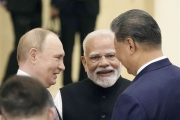
China’s political approach to Africa is arguably as ingenious as it is manipulative — and frankly, hypocritical.
Many Africans view Europe as a self-serving continent that has deliberately “misunderstood” what Africans have wanted or needed through the centuries, and they view Westerners in general as being under the misguided notion that the “dark continent” is a passive, helpless entity to be exploited — a trove of natural resources and cheap labor.
On the contrary, for at least the last decade, China has effectively portrayed itself as a safe and favored economic partner for African countries wishing to emulate the Asian nation’s rapid development. However, China’s traits of “new colonialism” and inhumane tendencies are slowly being unveiled to Africans with each passing day.
It would be fair to suggest that Africans are currently outraged by the xenophobia and other human-rights violations directed against fellow African nationals living and working in Xinjiang, Guangzhou, and Beijing. According to Deprose Muchena, East and Southern Africa Director at Amnesty International,
China likes to claim relations with African states are “win-win” with “no strings attached,” as Beijing provides infrastructure, technology and opportunity in exchange for access to natural resources…. It appears that African leaders’ silence on violations against their people in China is the price they are willing to pay for continued business funding and medical aid.
Yet these human-rights violations occur outside the China’s borders. Muchena went on to say,
At Amnesty International, we have documented the human cost of Chinese mining in Mozambique and the Central African Republic and China’s role in the supply chains of cobalt mined by children and adults in hazardous conditions in the Democratic Republic of the Congo.
Far from being “isolated incidents,” digging deeper into this relationship tells us that xenophobia is one of the many problems lurking beneath its surface.
An American bimonthly, the National Interest (TNI) — published by a nonpartisan public-policy think tank based in Washington, D.C. — issued an article in 2016 inferring that China was perceived by Africans as having a more humane approach to Africa than Western Civilization, since China suffered humiliation by Western imperialism yet managed to emerge as a great world power. The author of this particular article, Frederick Kuo, went on to suggest that Africa credits China for its transfiguration into an engine of global economic growth — in glaring contrast to its gripe with Europe over that continent’s former colonial ambitions and current military interventions.
While Kuo, a San Francisco-based writer and UCLA graduate, claimed to be upholding TNI’s mission to understand nations as they understand themselves, he made some alarming inferences allegedly “from an African perspective” with which this writer disagrees.
Firstly, it is doubtful that South Africans believe they inherited an “economic disaster” from the Apartheid Regime. Aside from the great inventions and innovations developed by South Africans in the 20th century — such as the world’s first oil-from-gas company; the CT scan; the world’s first heart transplant; and the invention of the first stable Wavemeter, flame ionization detector, tellurometer, surgical tool to remove unwanted tissue, diamond vitrectomy cutter, Scheffel bogie, Kreepy Krauly pool cleaner, military attack helicopter capable of making a 360 degree loop, Flightscope, prepaid mobile phone, the Action Potential Simulation Therapy device, Speed Gun, Shark Shield, Cybertracker, and Hippo Water Roller — South Africa had a thriving, First World economy for many years. According to historical exchange rates website fxtop.com, on 26 February 1980, ZAR1.00 (South African Rand) bought you USD1.24.
Secondly, the idea that Africans viewed Western Christian missionaries as self-righteous vehicles of supposed ‘enlightenment’ — imposing their religion on masses of heathen souls in order to selfishly feed their own savior complexes – seems unsubstantiated. When 80 percent of South Africa’s population consider themselves Christians, it defies logic that a religion viewed as a “white supremacist infiltration” would have been adopted so willingly by the black majority (who represent 76.4 percent of the population). In fact, 2019 research by the Pew Research Center showed that Africa as a continent currently has the largest population of Christians in the world.
Speculation concerning perceptions aside, the Chinese have done nothing to prove that they’re worthy of Africa’s trust — or that they have the right to throw stones at Europeans over colonialism. The facts speak for themselves — China is able to source platinum from Zimbabwe; oil from Angola, Nigeria and Sudan; cocoa from Ghana; and diamonds from Sierra Leone; all on its own terms. In addition, China is building pipelines and highways in Africa in order to send more resources to back to China — using Chinese equipment and labor. China is also flooding African markets with cheap goods of questionable quality, forcing local manufacturers out of the market; exerting greater weight on African political, cultural, and security dynamics because the Chinese government has extended loans designed to make cash-starved African countries beholden to China; and getting Africa to sign bilateral trade agreements that are skewed heavily in China’s favor.





